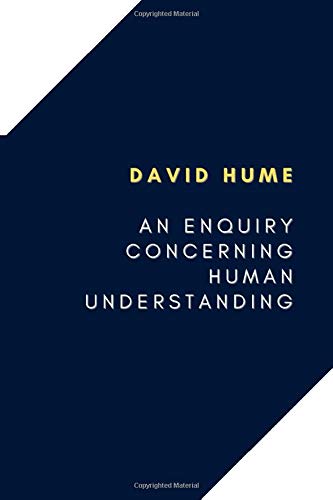


An Enquiry Concerning Human Understanding
R**Y
One of the Greatest Works of Western Philosophy!
Rene Descartes (1596-1650), "the father of modern philosophy," was a rationalist who attempted to attain certainty by discovering "first principles" on which he could overcome skeptical doubt and establish irrefutable truth. He claimed that one thing is absolutely certain: Cogito, ergo sum ("I think, therefore I am"). From this solid rock on which to stand, he proceeded to claim that by reason alone he could prove the existence of God, the immortality of the soul, and the reality of an afterlife.Immanuel Kant (1724-1804) was trained in the rationalist tradition, but when he read David Hume's work, the impact shattered his way of thinking. In the preface to his `Prolegomenon,' Kant stated that reading Hume woke him from his "dogmatic slumbers." If Hume was right, then metaphysics, as Kant had previously believed it, was impossible, nothing but "sophistry and illusion." In his most famous work, Critique of Pure Reason, Kant wrote, "I have therefore found it necessary to deny knowledge [that is, show the limits of reason and human understanding] in order to make room for faith."An empiricist and skeptic, David Hume (1711-1776) was born and died in Edinburgh, Scotland. His magnum opus, An Enquiry Concerning Human Understanding (1748), like Kant's Critique of Pure Reason (1781), is one of the key texts of the 18th-century Enlightenment. Taking a dim view of miracles, mysticism, and metaphysics, Hume skeptically asserted that empirical proofs of religion (such as the existence of God, the immortality of the soul, and an afterlife) are not possible. In effect, he was saying (to paraphrase Kant), "I have therefore found it necessary to deny knowledge [that is, reason and human understanding] in order to make room for lack of faith [that is, to make room for skepticism and unbelief]."In the famous last paragraph of his Enquiry, Hume writes: "When we run over libraries, persuaded of these [empirical and skeptical] principles, what havoc must we make? If we take in our hand any volume: of divinity or school metaphysics, for instance, let us ask: Does it contain any abstract reasoning concerning quantity or number? No. Does it contain any experimental reasoning concerning matter of fact and experience? No. Commit it then to the flames: For it can contain nothing but sophistry and illusion."Hume clarifies the terms "a priori" reasoning (deduction) and "a posteriori" empiricism (induction). Deductive reasoning is done "before experience," such as the mathematical conclusion that 2 + 2 = 4. Inductive reasoning is done "after experience"; it is the scientific method (forming hypotheses, performing experiments, and observing phenomena). The former process, "abstract reasoning concerning quantity or number" (as in mathematics and geometry), does indeed produce certainty. However, the latter process produces, at best, only probability (albeit often a strong probability), based as it is on the assumption of "the uniformity of nature" (that the universe will be the same in the future as it is in the present). Therefore, Hume's "empiricism" is qualified by its open-ended character (as scientific hypotheses are subject to revision as new evidence is produced).Hume's "skepticism" is also qualified. Although Hume admits that, technically, Pyrrhonism (excessive skepticism) cannot be philosophically disproven, Hume recommends the practicality of a "mitigated" or moderate skepticism that acknowledges the importance of common sense and common life.Hume's Enquiry is, one might quip, not an easy work for our "human understanding" to grasp. This is especially true of his erudite, but daunting, explications of cause and effect. Another challenging chapter deals with the ages-old dispute between determinism and free will. His controversial and provocative essay, "Of Miracles," caused howls of protest from those accusing him of atheism, and resulted in his forever being excluded from a professional academic career.The Clarendon Critical Edition of Hume's Enquiry is recommended. It contains a substantial (55-page) introduction by the editor (Tom L. Beauchamp, Professor of Philosophy at Georgetown University), who explains the intellectual background to the work and surveys its main themes. This edition also includes detailed explanatory notes on the text, annotations, a glossary of terms, a full list of references, and a section of supplementary readings.
G**H
A philosopher for the non-professional
I'm not a professional philosopher. My field is literature. What Hume offers me is one of the first examples in English of modern, concise prose that aims more than anything for clarity. Yes, Hume as a philosopher is a great step towards the Kant of "The Critique of Pure Reason" (I do have a minor in philosophy). But the perfection and clarity of his writing is what interests me most. Hume is a milepost in English literature. No one before or since has presented abstract thoughts more clearly.
M**S
College text
This book is a required read for most philosophy programs across the country for both undergraduate and graduate studies. If you're not in a college class where you can find other minds to chew this with I would recommend reading journal articles or other writings from philosophers that responded in some way to the premise this author is putting forth.
S**K
One of the greats
One of the great philosophers of all time. To read him is to understand the enlightenment movement that led to the creation of the United States.
B**N
Scam
This was not the book. It was only the title and a short synopsis.
H**Z
A giant of a work
Hume revolutionized philosophy, and scientific thinking of a philosphical bent, with this volume. It is quite readable, especially as compared to Kant's momunental response in the latter's Critique of Pure Reason.
F**K
Hume at his best
David Hume was perhaps the leading light in the Empiricist movement in philosophy. Empiricism is seen in distinction from Rationalism, in that it doubts the viability of universal principles (rational or otherwise), and uses sense data as the basis of all knowledge - experience is the source of knowledge. Hume was a skeptic as well as empiricist, and had radical (for the time) atheist ideas that often got in the way of his professional advancement, but given his reliance on experience (and the kinds of experiences he had), his problem with much that was considered conventional was understandable.Hume's major work, 'A Treatise of Human Nature', was not well received intially - according to Hume, 'it fell dead-born from the press'. Hume reworked the first part of this work in a more popular way for this text, which has become a standard, and perhaps the best introduction to Empiricism.In a nutshell, the idea of empiricism is that experience teaches, and rules and understanding are derived from this. However, for Hume this wasn't sufficient. Just because billiard balls when striking always behave in a certain manner, or just because the sun always rose in the morning, there was no direct causal connection that could be automatically affirmed - we assume a necessary connection, but how can this be proved?Hume's ideas impact not only metaphysics, but also epistemology and psychology. Hume develops empiricism to a point that empiricism is practically unsupportable (and it is in this regard that Kant sees this text as a very important piece, and works toward his synthesis of Empiricism and Rationalism). For Hume, empirical thought requires skepticism, but leaves it unresolved as far as what one then needs to accept with regard to reason and understanding. According to scholar Eric Steinberg, 'A view that pervades nearly all of Hume's philosophical writings is that both ancient and modern philosophers have been guilty of optimistic and exaggerated claims for the power of human reason.'Some have seen Hume as presenting a fundamental mistrust of daily belief while recognising that we cannot escape from some sort of framework; others have seen Hume as working toward a more naturalist paradigm of human understanding. In fact, Hume is open to a number of different interpretations, and these different interpretations have been taken up by subsequent philosophers to develop areas of synthetic philosophical ideas, as well as further developments more directly out of Empiricism (such as Phenomenology).The text of Hume is in fact a rather short book, a mere 100 pages or so in many editions (it is about 120 in this edition). As a primer for understanding Hume, the British Empiricists (who include Hobbes, Locke, and Berkeley), as well as the major philosphical concerns of the eighteenth century, this is a great text with which to start.
F**E
Despite speaking with Amazon... a full e-book ...
Despite speaking with Amazon ... a full e-book was never sent to me (got a couple of pages ... tops). I sent it back, deleted it , whatever, from my iPad.
A**A
Texto alterado com linguagem coloquial
Esse texto foi modificado usando linguagem coloquial e moderna. Não recomendado para estuda acadêmico.
C**N
Terrible edition
Most of the time you are under the impression it is an automatic translation from a foreign language. And a bad one at that. As a result, the speech is rather difficult to follow
P**S
Schlechteste Ausgabe, die ich je hatte!
Das "Taschenbuchformat" von Humes Enquiry ist das Schlechteste, was ich je von Buch in Händen hielt. Ich rede nicht vom Inhalt - sondern lediglich von der Ausgabe. Hinten steht, "Amazon Distribution GmbH" habe das Buch gedruckt, aber das "Buch" zu nennen ist mehr als euphemistisch.Warum?1. Keine Seitenzahlen!!2. Das "Inhaltsverzeichnis" (index) ist nicht nutzbar aufgrund fehlender Seitenzahlen.3. Formatierung grausam! Sieht aus, als hätte man einfach den Text auf ein Format gebracht und losgedruckt, ohne zu kontrollieren. Ganz unten auf der Seite fängt plötzlich "SECTION V" an, die Überschrift folgt dann auf der nächsten Seite ganz oben. Von einem wissenschaftlichen Druck ganz zu schweigen.4. Das Buch enthält Fehler. Es stehen Fragezeichen mitten im Text.5. Es fehlen Angaben bzgl. Erscheinungsjahr, Ursprung etc. (da auch kein Kommentar, keine Vorrede oder Beschreibung zu finden ist).Frechheit, Geld für so einen Mist zu verlangen. Da druck ich mir das Ganze lieber selber raus [...]
R**Z
Amazing. Buy his original treatise too!
I enjoyed this so much, I am actually going to buy the original - Hume's Treatise of Human Nature. Hume himself spent the rest of his life claiming to hate that book, written in the enthusiasm of his youth. This book was supposed to summarise his arguments in a much more "politically correct" way for back then. This book is extremely interesting, and Hume's writing on subjects like Miracles is absolutely superb. Written hundreds of years ago, it is still considered one of the most important books ever written in english.
R**R
Appalling transcription
I should have read the other one-star reviews before purchasing this edition. My alarm bells rang with the transcription of the first line, which in the original reads "Moral philosophy, or the science of human nature.." has been transcribed as "Moral philosophy, or the technologial know-how of human nature..", then goes on to refer to "man" as "guy" and "objects" as "gadgets". Elsewhere in the first paragraph the language degenerates into utter gibberish. The overall impression is that the original has been translated into a foreign language and then translated back by someone (or something) whose first language is not English. This edition is complete garbage and should never have been published.
Trustpilot
2 weeks ago
4 days ago